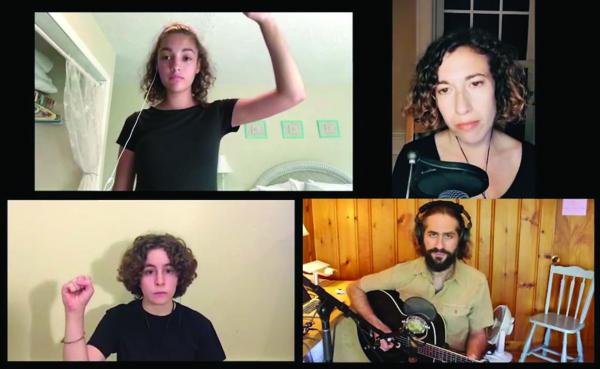September 10, 2020

(Clockwise from top left) Nina O'Loughlin, Valerie Sussman, Muhammad Seven, and Emmie Knippen
Earlier this summer, Muhammad Seven and the Spring, a local band fronted by Dorchester resident and songwriter Nima Samimi, enlisted the vocal power of several Boston City Singers choir members to create a virtual Black Lives Matter-themed tribute, “In the Name of Amadou Diallo.”
Samimi explained that he wrote the song in 2016 in the wake of the murder of Philando Castile in Minnesota. The tune honors Amadou Diallo, a Guinean immigrant shot and killed by police in New York in 1999, as well as dozens of other victims who have since met similar fates. Today, the message of the song, which places the names of victims of police killings front and center, still rings true.
“The song celebrates and remembers Black people in the United States who have been murdered by the police and offers us an opportunity to say their names and grieve the loss of their bright lights in our world,” wrote Samimi in a statement. “First and foremost I wrote it so that I myself could make a practice of saying their names, remembering their humanity, and facing the tears I still must cry in order to fight to change racism in law enforcement - and all our institutions...
“What moved me to release this song at this moment is the fact that our voices of protest and indignation have risen, thanks to the work of so many.”
Samimi and his band members recorded their individual performances remotely and edited them together to imitate a live recording. Vocalists from Boston City Singers also sang from their own homes for the virtual collaboration.
Program manager Carmen Piedad said that while the project presented some new challenges for students, often requiring them to record multiple takes and explore new technological methods, it also marked an opportunity for education and catharsis.
“Most of our kids didn’t know who [Diallo] was, so it was an opportunity to talk to them about another case of police violence, and for them to learn the history of what is unfortunately an ongoing problem,” she said.
Samimi reached out to Boston City Singers about the project in June, as BLM protests were gathering momentum. At a time when many students were feeling helpless and discouraged by compounding factors of injustice and the pandemic, Piedad said it was the “perfect” moment. “It was a really great way for them to have a sense of purpose during a time that felt hopeless.”


